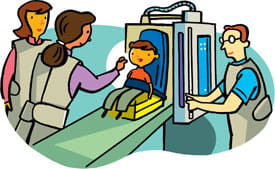The modified barium swallow is done at the Department of Pediatric Radiology of UPMC Children’s Hospital. You will begin the appointment by meeting with a speech/language specialist, who is specially trained in swallowing disorders, to discuss your concerns about your child’s swallowing problems and answer any questions you may have about the test. The modified barium swallow will be done in a fluoroscopy (floor-OS-co-pee) room with:
- The speech/language specialist
- A pediatric radiology doctor who will be taking the X-ray pictures of your child’s throat
- An X-ray technologist who will be helping the doctor
In the room, you will see an X-ray machine, a television screen and a special chair. You might explain to your child that the X-ray machine is a large camera for taking pictures that will be shown on the television.
- Your child will be awake during this test.
- Your child will be asked to sit up in the chair just as he or she would eat at home.
- A seat belt will be placed over your child’s waist in the chair but your child will not be restrained.
- The speech/language specialist will mix the foods and liquids that are brought from home with a milky material called barium that will make the foods and drinks show up on the X-ray as your child is swallowing. You may want to explain to your child that the barium will change the taste and appearance of the foods and liquids.
- As your child eats and drinks the foods and liquids mixed with barium, the doctor will move the X-ray camera next to your child. The camera will come close to, but not touch, your child.
- The speech/language specialist may try to help your child swallow better by using different cups or bottles that have been brought from home, as well as straws and syringes.
- The speech/language specialist may also try thickening bottle feedings, typically by using barium mixed with either pudding or rice cereal.
- When the X-rays are complete, the speech/language specialist will meet with you in a consultation area to discuss the results of the exam. Recommendations to improve the way your child swallows will be given to you at this time.
As a parent, you may have concerns about radiation exposure. UPMC Children’s takes every precaution to make sure your child is safe.
- Our goal is to do the test correctly and thoroughly, while exposing your child to the smallest amount of radiation necessary to take the X-rays.
- Advances in equipment and film have lowered the amount of radiation your child will receive.
- All of the equipment is inspected regularly.
- Parts of the body that are not being X-rayed will be protected with a lead cover or apron when possible.









 At
At